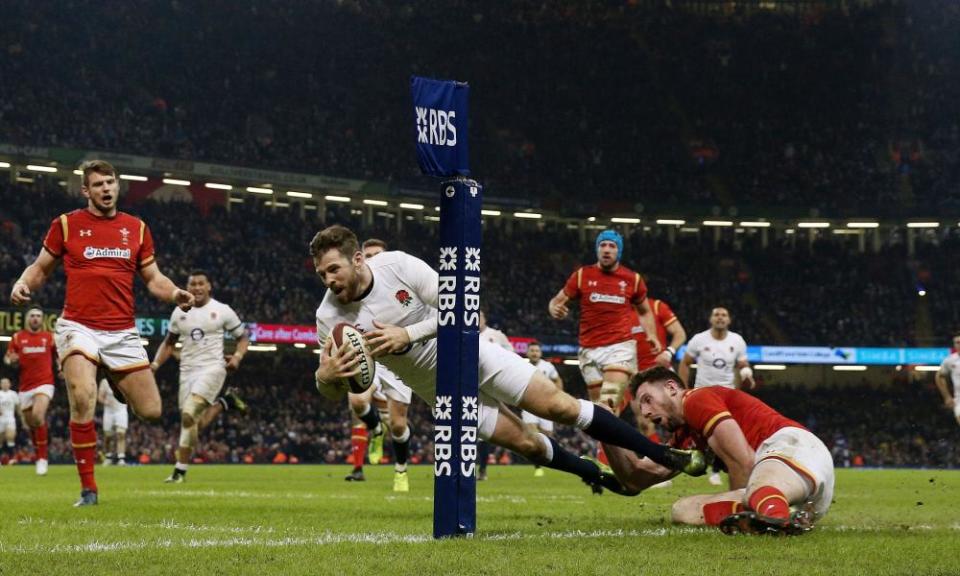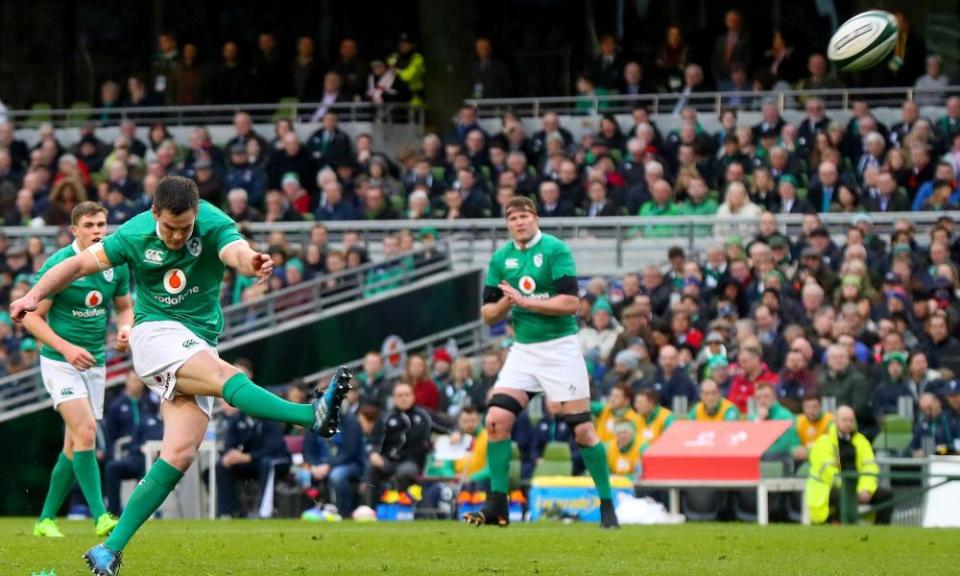All Blacks have nothing to fear, for all the fury of the Six Nations | Paul Rees

The Six Nations is the envy of the southern hemisphere – for its licence to print money rather than the quality of the rugby it inspires. England retained the title but were written off in New Zealand as clunky musclemen who live in a cave, a view compromised by the praise then lavished on Ireland, whose record of two tries in their final three matches was hardly a testament to their perceived verve and guile.
Bonus points were trialled this year in order to, in the words of the tournament’s chairman, Pat Whelan, “materially improve what we already have and enhance the competition as a spectacle”. The system made no difference beyond providing consolation in defeat and overall the 2017 tournament was summed up in the meeting between France and Scotland in Paris, when the physical onslaught of the home side subdued opponents who had tried to dance around the ring.
It was, to borrow from Arsène Wenger, largely rugby with the handbrake on. England retained their title, minus the grand slam this time, because they found a way to win in Cardiff as full-time loomed. It was – factoring out Italy, whose cause looked hopeless before they played their first match because their basement partners, Scotland, had by then beaten Ireland – the only away win in matches involving the old Five Nations countries.
An inability to create under pressure cost most of the sides: England failed to score a try in Dublin for the third Six Nations match in a row; Wales were like an unsweetened cake, blessed with all the ingredients except one, and kept going on about their mean defence as if to deflect attention from their gaucheness in attack; Ireland, like Wales, were at their most effective when a game went according to script, struggling when they had to react and adapt; and France played as if they had not long been shaken from a deep sleep, blinking their way into a new era.
The title should not have been beyond the four teams who finished below England and above Italy. Ireland missed Johnny Sexton in Scotland and conceded two tries in Cardiff when the fly-half was off the field: for all the collective strength they have generated under Joe Schmidt, they do not have the imagination or wit of the Leinster side he coached. Like Wales, their play is prescriptive, while Scotland, lacking a platform at forward, are more anarchic, forced to take risks. England lie in between, as Eddie Jones tells his players to take the initiative and not look to the sidelines for instructions.
Had they achieved the grand slam in Dublin and broken New Zealand’s record of 18 consecutive victories for a tier-one nation, it would have said more about the teams below England in the world rankings than themselves.
Jones described the match as the most beneficial in his time in charge of England because his players would learn from defeat. They have throughout his time in charge been vulnerable when unable to secure quick possession: Ireland’s tactic of stopping opponents from quickly getting back on their feet put pressure on the scrum-half Ben Youngs, which in turn affected their threat behind, and they were unable to pass their way out of trouble.
It was the cue for guffaws among the chattering classes in New Zealand: England are no better under Jones than they were before, reverting to bone-headed type under pressure. It looks wishful thinking because, as he has said from day one, the Tasmanian wants his team to peak in 2019, not in the 2017 Six Nations. A series of injuries gave the head coach opportunity to look at his options in a number of positions and expose more players to his methods.
Jones has been at his most diplomatic when talking about the Premiership clubs who supply his players but his actions have revealed his feelings: he wants his players to be better conditioned to play at a high pace and intensity and he has placed a far higher emphasis on skill. His focus is on the 2019 World Cup and the one team above them in the rankings, New Zealand. Only Scotland engaged England in the type of skirmish they will have with the All Blacks when the teams finally meet in the autumn of next year, .

Jones tried to get a fixture this December at Twickenham when New Zealand face the Barbarians on the basis that the earlier his players are exposed to the game’s pacesetters, the better. The request was turned down, which could be taken as a sign that the All Blacks’ management have more respect for England than their media, although, as in 2012 when they lost to England, the Test would have come at end of a season that had started more than nine months before. Let England wallow in the mediocrity of the Six Nations and an autumn campaign that should not overly extend them.
England need France to help raise the standard and there are signs Les Bleus might. The game there has in effect been run by the clubs for the past decade, but Bernard Laporte, the president of the French Rugby Federation, and his sidekick Serge Simon are exerting their authority over the Top 14 by exploiting French law, which in essence stipulates that teams have to operate with the consent of their governing body. Laporte’s reaction to the proposed merger between Racing 92 and Stade Français was to threaten to shut down Ligue Nationale de Rugby, the body that runs the Top 14. He wants the leading 40 players in the country to be contracted to the French Rugby Federation and to allow the national head coach as much time with his players as his Six Nations rivals have with theirs.
He wants to put France first and the Six Nations needs him to succeed. In matches not involving Italy, Scotland scored 10 tries – the only team to cross the line in every match – England nine, Wales and Ireland five and France four. It was not a tournament to panic the All Blacks as they look towards the Lions tour: there was commitment and fury aplenty but little of the finesse, subtlety and poise that will be needed in June and July. Too many coaches seem to have become allergic to even a trace of individualism.
The Six Nations, for all its commercial clout, is still not at the cutting edge of the game. Jones knows that, which is why he has not played it safe with England, and the manner of their defeat in Ireland, like Ireland’s in Cardiff eight days before, failing to react as a plan unravelled, was not what the Lions needed before rugby’s ultimate test.

 Yahoo Sport
Yahoo Sport 





































